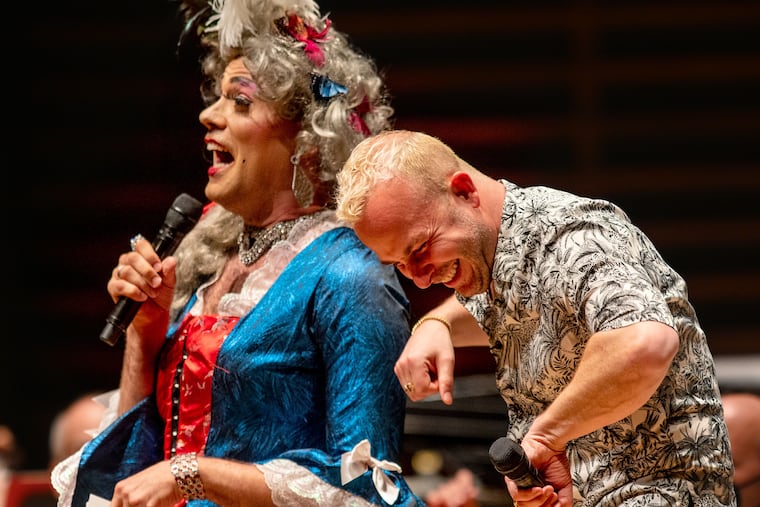Take some Tchaikovsky, add a drag queen: Philadelphia Orchestra’s first-ever Pride concert
Martha Graham Cracker camped it up with conductor Yannick Nezet-Seguin.

A violin concerto, a busily percussive piece by hometown favorite Jennifer Higdon, and a dash of Tchaikovsky. In many ways, it was like any other Philadelphia Orchestra concert.
Not a lot of evenings at the orchestra, though, reach an emotional climax with a towering drag queen singing “Somewhere Over the Rainbow.”
This wasn’t the first time, actually, that the orchestra rode the broad, outrageously blingy coattails of a drag queen to a place of greater social relevance.
But Thursday night’s event was historic, nonetheless: the orchestra’s first-ever Pride concert.
Billed as a reach-out to Philadelphia’s LGBTQ+ communities, the free concert packed Verizon Hall. The Philadelphia Gay Men’s Chorus, 33 members strong, lined the conductor’s circle in a rainbow’s variety of colored shirts. The roster of (mostly) gay composers was chosen to underline the contributions of gay and lesbian artists.
The concert also served as a fascinating marker of time. A dozen years ago, when orchestra music director Yannick Nézet-Séguin first came to town, he didn’t talk much about his private life. Thursday night, presiding over the concert, he repeatedly referred to himself as part of the LGBTQ+ communities and talked of Pierre Tourville, his longtime partner (to whom he is now married).
But the performing phenomenon that drew the evening’s main focus was Philadelphia drag royalty Martha Graham Cracker, who introduced pieces with brief spoken program notes, dropped a few double entendres, and carried on with Nézet-Séguin.
She expressed wonder at singing with an orchestra for the first time and, in a somebody-pinch-me reality-check moment, asked the conductor to do the pinching. He did.
“Lower down,” drag queen said to conductor.
Drag queens are high camp, of course, at once hirsute and astute, cutting and cunning, but most obviously a hilarious sight gag. There is, however, a more serious purpose to drag-queening these days that many miss, and which makes them perfect ambassadors for classical music. They are avatars of love and acceptance. All pretension and guard rails come down in the presence of this mythical creature.
And for an art form that still struggles with perceptions of elitism, nothing demolishes social barriers like a drag queen. They really should be running the world.
For the record, the ensemble’s first encounter with the species came with a Halloween appearance by the redhead with a heart of solid gold, Carlota Ttendant. That was two decades ago. The orchestra could probably pick up the pace a bit.
Still, Thursday felt like progress — out gay composers, out gay soloists, and an out gay conductor, Nézet-Séguin mused at one point in the concert. Not everyone had or has the luxury of being out, he reminded the audience. Tchaikovsky was represented with the Act I waltz from Swan Lake in a performance of such flexible tempos it seemed more invented for a high-spirited occasion than thoughtfully considered.
Other gay or lesbian composers on the program: Leonard Bernstein (his familiar Overture to Candide), Samuel Barber (two lovely movements from his Souvenirs Ballet Suite), and Higdon (her snappy Fanfare Ritmico).
Philadelphia may cherish LGBTQ+ talent and listeners, but there are still places in the world where the fight for acceptance goes on, Nézet-Séguin noted, and for a few moments of introspection he led the orchestra and Canadian violinist Blake Pouliot in The Red Violin, Chaconne for Violin and Orchestra by John Corigliano.
The 1998 film from which the music is drawn, The Red Violin, traces an instrument through the centuries, though this performance could be heard as something quite different. Pouliot’s virtuosity went from moments of great power and brawn to stratospheric notes so delicate they sounded like they could fall from the high-wire at any moment. Is there a better metaphor for what it means to be gay, even today?